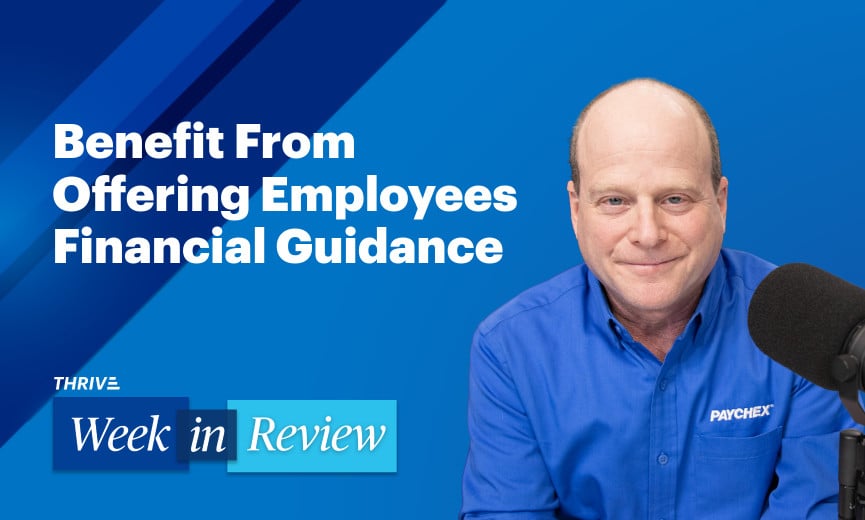- Thrive
-
Season
4Episode155
Changes to SBA Loan Process, Pet Bereavement Leave, and Gen Z Eyes the Trades
Podcast •
Watch
Summary
Are loans easier to get or more complex? Some changes in the SBA’s process has folks lining up on both sides. Gene Marks says that an SBA loan is still the way to go, especially with interest rate so high for traditional loans. A study stated that pet bereavement leave should be a must at the workplace, and Gene talks about some of the key findings to back the claim. And the next time you call for a plumber, don’t be surprised if the person isn’t in their mid-20s as Gen Zers are taking to the trades. Gene provides reasons why.
View Transcript
[Gene Marks, host]
Hey everybody, it's Gene Marks and welcome to this week's episode of the Paychex THRIVE Week in Review podcast. This is where we look at a few news items that happened during the week that impact your business and mine, and we talk about them a little bit.
And by the way, before we get started, if you haven't already, sign up for our Paychex THRIVE newsletter. You'll get tips and advice to help you run your business, and there's links to former archived episodes of this podcast. You can sign up paychex.com/thrive. Let's get right to the news, shall we?
The first bit of news comes from the Philadelphia Business Journal, which is part of American City Business Journals, and the news is about the overhaul of loan programs that the Small Business Administration has had. Some banks are optimistic, others not so much, but let me tell you what's going on.
According to the article, the SBA, under the Biden administration, has pushed to reform and revamp core agency programs, including its long-time lending programs, right? Some of these were, you know, very high profile. They're expanding the licenses of people that could actually apply for loans, you know, which, you know, which was good. Others include doing away with the so-called Franchise Directory of Approved Franchises. So, in other words, if you wanted an SBA loan, you had to be part of an approved franchise and that, you know, created bureaucratic hassles for a lot of businesses.
Then there were sudden changes, as well. For example, the SBA either reduced or eliminated some of the fees that banks were charging to their customers, their small-business customers for the loans, which is, you know, which is certainly good news. And then, also, they streamlined efforts around documentation and how much equity were required, and collateral, as well.
Now, remember, guys, if you know, you know, prime rate now is at 8.5%. I mean, you know, you know, financing is very expensive. I mean, you're probably if you're looking for a loan, you might be paying 2 or 3 points above that 8.5%. So, SBA loans are really a big deal, and the administration is doing a lot to try and make them as easier ss possible for, you know, for banks to loan them. Because also, remember, you don't get, loans directly from the SBA, you get through their member network of banks.
So, some banks are very bullish about this. They say the new SBA rules allow for more streamlined and flexible processes, which benefit both lenders and small businesses. This is one, you know, person from a credit union said. So, that's good. Other banks, you know, not as much. They're saying it's creating a little bit more complexity in the process for them, just trying to make sure they can keep up with all the rules.
The good news is that the SBA is really trying to take some steps to make it as easy as possible for us to get loans through their member banks, through their network. And we really want to go ahead and do that. Remember, SBA loans are guaranteed, for the most part by the federal government. So, they provide a really, really good source of financing, particularly in these times of high, you know, high interest rates and, lower availability of credit for small businesses.
Second piece of news comes from studyfinds.org, and it's all about – are you ready? – offering pet bereavement leave. There is an article here that says that it should be a policy in the workplace. What does this look like? Well, in the article, one study finds that, one CEO of a company was interviewed and said that pets themselves, you know, it's a great way for culture when there's pet bereavement. It affects people at a very deep level and, you know, and it is, it is an inexpensive way to provide a benefit that impacts so many of us. I mean, there are millions of us that own dogs and cats.
So, there were five reasons she gave why pet bereavement leave should be policy. Number one, it shows that you, as an employer, care about your employees, particularly your employees with pets. It also shows that number two, policies like this might attract employees, as well, to your business because, you know, there are so many pet owners that are out there.
Number three, she claims, it increases employee productivity. People don't have to worry so much about their pets and the disruption of it. So, you know, they can take out a couple days for bereavement, but then get right back to work. It helps them transition back to the workplace. Number four, it cultivates compassion and community in the workspace, and number five, pet bereavement leave contributes to increased employee retention.
So, you know, in in the end, I mean, you know, you hear about these kinds of policies that sound kind of goofy; like who would give time off for pet bereavement? You know, if you give a day off for pet bereavement, and it's a big deal for a lot of people. It's a really important thing. We get very, very close to our animals. It's a fairly inexpensive benefit to provide. It's a unique benefit which may set yourself apart from other employers looking for employees.
And who knows that offering that little benefit could be the difference between, you know, hiring that next employee and losing them to somebody else or retaining that good employee, as well. So, again, it's an inexpensive benefit to provide, and this article and studyfinds.org provided a pretty good case for doing just that.
The last bit of news that I thought was interesting this week comes from the Wall Street Journal, and it's all about how Generation Z is becoming the Tool Belt Generation. Let me read this out to you from the article. “Long beset by a labor crunch, the skilled trades are newly appealing to the youngest cohorts of American workers. Many of them are choosing to leave the college path. Rising pay and new technologies in the fields from welding to machine tooling are giving trade professionals a facelift, helping them shed the image of being dirty, low-end work. Growing skepticism about the return, of return on investment of a college education has grown. Obviously, the cost has soared in recent decades and it's adding to their shine.
Apparently, according to the Wall Street Journal, enrollment in vocational training programs is surging as overall enrollment in community colleges and four-year institutions has fallen. The number of students enrolled in vocational focused community colleges rose 16% last year to its highest level since the National Student Clearinghouse began tracking this data back in 2018. The ranks of students studying construction trades rose 23% during that time, while those in the programs covering HVAC, heating and air conditioning, and vehicle maintenance and repair increased 7%.
Yeah, I'm telling you, if you're in the construction industry, I know you're looking for good workers. We all are, and obviously there's a shortage of them, and there's pressures from an immigration standpoint. But it seems like a lot of younger workers, Gen Zers, these are a smart generation, and they look at the opportunities that are provided them by learning a trade and becoming technical and something like that. You not only have more flexibility, you earn greater pay, you can leverage new technologies that are coming out.
You pay so much less for a certification in this than you would going to a four-year college. And you know what? It sets yourself up if you want to be your own business one day. I mean, you spend 5 or 10 years in the construction trade, specialize in something, and maybe you open up your own construction business. There’s a lot of great opportunities in construction.
To be honest, if I had known that when I was younger, I would have strongly considered that compared to a four-year college – and the cost of the four-year college when I was going to college was significantly less than it is now. I can only imagine what parents are dealing with.
So again, that's a very interesting article in the Wall Street Journal that Gen Zers are moving towards technical trades in construction. If you're in that industry, pay attention.
My name is Gene Marks. Thanks for watching and listening to this week's episode of the Paychex THRIVE Week in Review. Again, if you'd like information to help your business, some advice, as well as archives of some of our older episodes, sign up to our Paychex THRIVE newsletter. Go to paychex.com/thrive.
Thank you very much for joining me. Hope you enjoyed and got some good information from the news this week, and I'll be back next week with some more news that impacts your business. See you then.
This podcast is property of Paychex, Incorporated, 2024. All rights reserved.

 Apple Podcast
Apple Podcast Spotify
Spotify iHeartRadio
iHeartRadio









